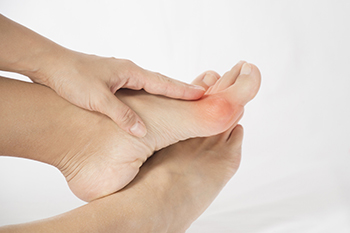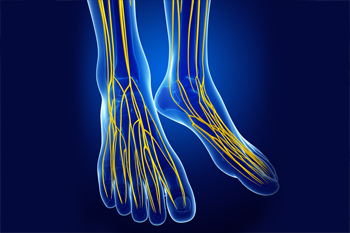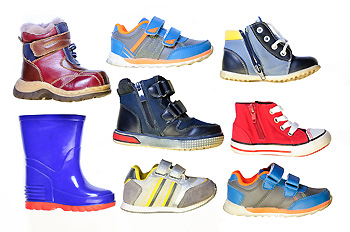Items filtered by date: April 2021
What Can Be Done About Bunions?
 A bunion is a common foot deformity characterized by a bony bump developing at the base of the big toe joint. Bunions can cause symptoms such as foot pain or soreness, redness, inflammation, a burning sensation, or numbness. Mostly, bunions can make it very uncomfortable to wear shoes or spend long periods of time on your feet. Fortunately, there are a variety of treatments available for bunions. Conservative treatments, such as changing your footwear, padding the bunion, wearing orthotic inserts, avoiding activities that cause bunion pain, icing the affected area, and taking anti-inflammatory medications to reduce pain, are often effective. In more severe cases, surgery may be necessary to eliminate the bunion. For more information about bunions and to determine what treatment option is best for you, please speak with a podiatrist.
A bunion is a common foot deformity characterized by a bony bump developing at the base of the big toe joint. Bunions can cause symptoms such as foot pain or soreness, redness, inflammation, a burning sensation, or numbness. Mostly, bunions can make it very uncomfortable to wear shoes or spend long periods of time on your feet. Fortunately, there are a variety of treatments available for bunions. Conservative treatments, such as changing your footwear, padding the bunion, wearing orthotic inserts, avoiding activities that cause bunion pain, icing the affected area, and taking anti-inflammatory medications to reduce pain, are often effective. In more severe cases, surgery may be necessary to eliminate the bunion. For more information about bunions and to determine what treatment option is best for you, please speak with a podiatrist.
If you are suffering from bunions, contact Dr. Joshua David Scoll of Pennsylvania. Our doctor can provide the care you need to keep you pain-free and on your feet.
What Is a Bunion?
A bunion is formed of swollen tissue or an enlargement of boney growth, usually located at the base joint of the toe that connects to the foot. The swelling occurs due to the bones in the big toe shifting inward, which impacts the other toes of the foot. This causes the area around the base of the big toe to become inflamed and painful.
Why Do Bunions Form?
Genetics – Susceptibility to bunions are often hereditary
Stress on the feet – Poorly fitted and uncomfortable footwear that places stress on feet, such as heels, can worsen existing bunions
How Are Bunions Diagnosed?
Doctors often perform two tests – blood tests and x-rays – when trying to diagnose bunions, especially in the early stages of development. Blood tests help determine if the foot pain is being caused by something else, such as arthritis, while x-rays provide a clear picture of your bone structure to your doctor.
How Are Bunions Treated?
- Refrain from wearing heels or similar shoes that cause discomfort
- Select wider shoes that can provide more comfort and reduce pain
- Anti-inflammatory and pain management drugs
- Orthotics or foot inserts
- Surgery
If you have any questions, please feel free to contact one of our offices located in Philadelphia, Bensalem, and Fairless Hills, PA . We offer the newest diagnostic and treatment technologies for all your foot care needs.
Heel Pain Can Be Treated!
Can Lifestyle Changes Help the Pain From Morton’s Neuroma?
 Numbing and tingling sensations between the third and fourth toes are often indications of a foot condition that is known as Morton’s neuroma. This ailment occurs from irritation of the nerve that lies in this location. It can happen for a variety of reasons, including wearing shoes that do not fit correctly, frequently participating in running and jumping activities, or possibly from an abnormal foot structure. A noticeable symptom can progress from a tingling feeling to a sharp or burning pain in the top of the foot, and many patients feel like there is a small stone between the toes. Research has indicated there are simple lifestyle changes that may help to ease the pain of Morton’s neuroma. These can include wearing shoes that have ample room for the toes to move freely in, or from wearing custom-made orthotics that can help to relieve the pressure from the damaged nerve. If you have this type of pain in your foot, please consult with a podiatrist who can determine what the best course of treatment is for you.
Numbing and tingling sensations between the third and fourth toes are often indications of a foot condition that is known as Morton’s neuroma. This ailment occurs from irritation of the nerve that lies in this location. It can happen for a variety of reasons, including wearing shoes that do not fit correctly, frequently participating in running and jumping activities, or possibly from an abnormal foot structure. A noticeable symptom can progress from a tingling feeling to a sharp or burning pain in the top of the foot, and many patients feel like there is a small stone between the toes. Research has indicated there are simple lifestyle changes that may help to ease the pain of Morton’s neuroma. These can include wearing shoes that have ample room for the toes to move freely in, or from wearing custom-made orthotics that can help to relieve the pressure from the damaged nerve. If you have this type of pain in your foot, please consult with a podiatrist who can determine what the best course of treatment is for you.
Morton’s neuroma is a very uncomfortable condition to live with. If you think you have Morton’s neuroma, contact Dr. Joshua David Scoll of Pennsylvania. Our doctor will attend to all of your foot care needs and answer any of your related questions.
Morton’s Neuroma
Morton's neuroma is a painful foot condition that commonly affects the areas between the second and third or third and fourth toe, although other areas of the foot are also susceptible. Morton’s neuroma is caused by an inflamed nerve in the foot that is being squeezed and aggravated by surrounding bones.
What Increases the Chances of Having Morton’s Neuroma?
- Ill-fitting high heels or shoes that add pressure to the toe or foot
- Jogging, running or any sport that involves constant impact to the foot
- Flat feet, bunions, and any other foot deformities
Morton’s neuroma is a very treatable condition. Orthotics and shoe inserts can often be used to alleviate the pain on the forefront of the feet. In more severe cases, corticosteroids can also be prescribed. In order to figure out the best treatment for your neuroma, it’s recommended to seek the care of a podiatrist who can diagnose your condition and provide different treatment options.
If you have any questions, please feel free to contact one of our offices located in Philadelphia, Bensalem, and Fairless Hills, PA . We offer the newest diagnostic and treatment technologies for all your foot care needs.
Diabetes and Children
 The summer months is a common time for diabetic families to inquire about proper foot health. Children with diabetes may walk barefoot outside, and a foot infection may occur as a result of a small cut in the skin of the feet. Research has indicated that diabetes may cause neuropathy. This is defined as a numbing sensation in the feet, and it is often difficult to feel cuts, bruises, and scrapes that may have occurred. It is important for parents to properly manage their children’s diabetes, and this may help children to lead more of a normal life. This can be accomplished by having your child receive a yearly foot exam, and it is beneficial to encourage participating in physical activities. If your child has diabetes, it is suggested that you visit a podiatrist who can help you to manage this condition.
The summer months is a common time for diabetic families to inquire about proper foot health. Children with diabetes may walk barefoot outside, and a foot infection may occur as a result of a small cut in the skin of the feet. Research has indicated that diabetes may cause neuropathy. This is defined as a numbing sensation in the feet, and it is often difficult to feel cuts, bruises, and scrapes that may have occurred. It is important for parents to properly manage their children’s diabetes, and this may help children to lead more of a normal life. This can be accomplished by having your child receive a yearly foot exam, and it is beneficial to encourage participating in physical activities. If your child has diabetes, it is suggested that you visit a podiatrist who can help you to manage this condition.
Diabetic foot care is important in preventing foot ailments such as ulcers. If you are suffering from diabetes or have any other concerns about your feet, contact Dr. Joshua David Scoll from Pennsylvania. Our doctor can provide the care you need to keep you pain-free and on your feet.
Diabetic Foot Care
Diabetes affects millions of people every year. The condition can damage blood vessels in many parts of the body, especially the feet. Because of this, taking care of your feet is essential if you have diabetes, and having a podiatrist help monitor your foot health is highly recommended.
The Importance of Caring for Your Feet
- Routinely inspect your feet for bruises or sores.
- Wear socks that fit your feet comfortably.
- Wear comfortable shoes that provide adequate support.
Patients with diabetes should have their doctor monitor their blood levels, as blood sugar levels play such a huge role in diabetic care. Monitoring these levels on a regular basis is highly advised.
It is always best to inform your healthcare professional of any concerns you may have regarding your feet, especially for diabetic patients. Early treatment and routine foot examinations are keys to maintaining proper health, especially because severe complications can arise if proper treatment is not applied.
If you have any questions please feel free to contact one of our offices located in Philadelphia, Bensalem, and Fairless Hills, PA . We offer the newest diagnostic and treatment technologies for all your foot and ankle needs.
The Right Shoes May Prevent Foot Problems in Kids
 Children, like adults, can have a variety of foot problems. Many children have flat feet, an overpronated gait, blisters, calluses, or corns. The right shoes can help mitigate some of these issues. Children with flat feet often have an overpronated gait in which their feet roll inwards as they walk. The right pair of shoes can help correct overpronation and adequately support your child’s feet. Blisters, calluses, and corns all affect the skin of the feet. The most common culprit behind these issues is wearing the wrong shoes. Shoes that are too small, tight, or narrow put excess pressure and friction on the feet, causing these skin problems to develop. Not wearing socks can sometimes make these problems worse. To avoid irritations to the skin of the feet, it is important to wear shoes that fit properly and socks to protect the feet. If your child has foot problems, please consult with a podiatrist.
Children, like adults, can have a variety of foot problems. Many children have flat feet, an overpronated gait, blisters, calluses, or corns. The right shoes can help mitigate some of these issues. Children with flat feet often have an overpronated gait in which their feet roll inwards as they walk. The right pair of shoes can help correct overpronation and adequately support your child’s feet. Blisters, calluses, and corns all affect the skin of the feet. The most common culprit behind these issues is wearing the wrong shoes. Shoes that are too small, tight, or narrow put excess pressure and friction on the feet, causing these skin problems to develop. Not wearing socks can sometimes make these problems worse. To avoid irritations to the skin of the feet, it is important to wear shoes that fit properly and socks to protect the feet. If your child has foot problems, please consult with a podiatrist.
Making sure that your children maintain good foot health is very important as they grow. If you have any questions, contact Dr. Joshua David Scoll of Pennsylvania. Our doctor can provide the care you need to keep you pain-free and on your feet.
Keeping Children's Feet Healthy
Having healthy feet during childhood can help prevent medical problems later in life, namely in the back and legs. As children grow, their feet require different types of care. Here are some things to consider...
Although babies do not walk yet, it is still very important to take care of their feet.
Avoid putting tight shoes or socks on his or her feet.
Allow the baby to stretch and kick his or her feet to feel comfortable.
As a toddler, kids are now on the move and begin to develop differently. At this age, toddlers are getting a feel for walking, so don’t be alarmed if your toddler is unsteady or ‘walks funny’.
As your child gets older, it is important to teach them how to take care of their feet.
Show them proper hygiene to prevent infections such as fungus.
Be watchful for any pain or injury.
Have all injuries checked by a doctor as soon as possible.
Comfortable, protective shoes should always be worn, especially at play.
If you have any questions please feel free to contact one of our offices located in Philadelphia, Bensalem, and Fairless Hills, PA . We offer the newest diagnostic and treatment technologies for all your foot and ankle needs.

